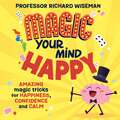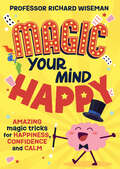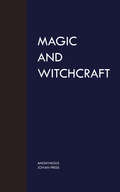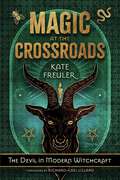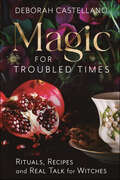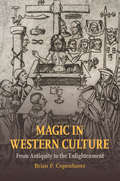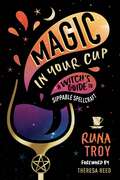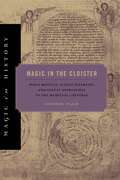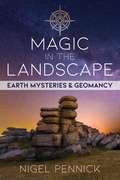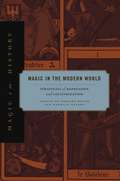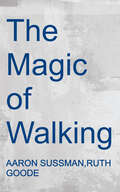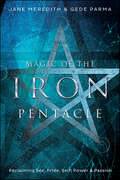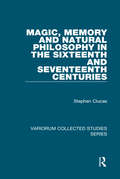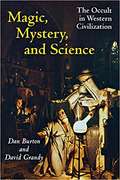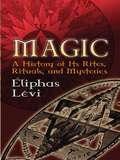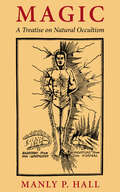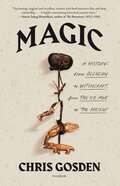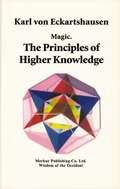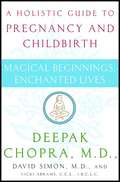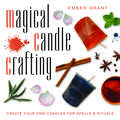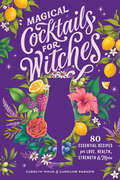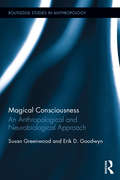- Table View
- List View
Magic Your Mind Happy: Amazing magic tricks for happiness, confidence and calm
by Richard WisemanFor centuries, magicians have astounded and delighted audiences with incredible illusions. But here's their biggest and best-kept secret: learning magic tricks can help you grow your confidence, feel happier, and boost your brain power!Professor Richard Wiseman, psychology professor and member of the prestigious Magic Circle, reveals the secrets behind some jaw-dropping magic tricks that will bring out the magic in YOU - and teach you some cool skills to impress your friends!Learn to defy gravity, read minds, pluck coins from thin air, make a sausage appear from nowhere AND predict the future, all while boosting your mental wellbeing, resilience and self-belief. Magic Your Mind Happy will show you how to master the awe-inspiring ancient art of performing magic, anytime, anywhere and for anyone.IT'S FUN, IT'S EASY, IT'S MAGIC!
Magic Your Mind Happy: Amazing magic tricks for happiness, confidence and calm
by Richard WisemanFor centuries, magicians have astounded and delighted audiences with incredible illusions. But here's their biggest and best-kept secret: learning magic tricks can help you grow your confidence, feel happier, and boost your brain power!Professor Richard Wiseman, psychology professor and member of the prestigious Magic Circle, reveals the secrets behind some jaw-dropping magic tricks that will bring out the magic in YOU - and teach you some cool skills to impress your friends!Learn to defy gravity, read minds, pluck coins from thin air, make a sausage appear from nowhere AND predict the future, all while boosting your mental wellbeing, resilience and self-belief. Magic Your Mind Happy will show you how to master the awe-inspiring ancient art of performing magic, anytime, anywhere and for anyone.IT'S FUN, IT'S EASY, IT'S MAGIC!
Magic and Witchcraft
by AnonymousThis book of the worthy Church-Counsellor is rather a singular one: it is not a history of Magic, but a sort of spiritual periodical, or magazine of infernal science, supported in a great measure by contributions from persons of a ghostly turn of mind, who, although they affect occasionally to write in a Sadducee vein, are many of them half-believers at heart, and would not walk through a churchyard at night, except for a consideration larger than we should like to pay. The field over which it travels is too extensive, for us to attempt to follow the author throughout his elaborate subdivisions. Dante divided hell, like Germany, into circles; and Mr. Horst, adopting something of a similar arrangement, has parcelled out the territory of the Prince of the Air into sundry regular divisions, by which its whole bearings and distances are made plain enough for the use of infant schools. It is only at one of the provinces of the Inferno, however, that we can at present afford to glance; though for those who are inclined to make the grand tour, the Counsellor may be taken as an intelligent travelling companion, well acquainted with the road. In fact his work is so methodical and distinct, and the geography of the infernal regions so clearly laid down, according to the best authorities, from Jamblichus and Porphyry down to Glanvil and the Abbé Fiard, that the whole district is now about as well known as the course of the Niger; and it must be the traveller’s own fault if he does not find his exit from Avernus as easy as its entrance has proverbially been since the days of Virgil...
Magic at the Crossroads: The Devil in Modern Witchcraft
by Kate FreulerExplore the Forbidden Path of the Ultimate RebelWhen you separate the religious dogma from the symbolic nature of the devil, who really is he? Kate Freuler presents the infamous figure as a symbol, not a deity, and reveals how to use this radical philosophy to strengthen yourself and your witchcraft.The devil represents rebelling against all-powerful, oppressive systems of any kind. Through historical references, religious writings, and pop culture, this book explores the intersection between witchcraft and the rebel archetype. Freuler dispels common myths, providing examples from a variety of texts and personal stories about her own connection to this misunderstood symbol. She also shares a variety of hands-on rituals you can use for self-empowerment. From the devil's relationship with the old gods to the shadow work associated with him, Magic at the Crossroads invites you to see this controversial symbol with new eyes.
Magic for Troubled Times: Rituals, Recipes, and Real Talk for Witches
by Deborah CastellanoSpells, Rituals, and Guidance for Your Transformative Journey through Troubled TimesMagic is always possible, even when it's hard to see. No matter what you're struggling with, this book can help you overcome it. Featuring gentle ways to recover and a magical plan of action, Magic for Troubled Times gives you the courage to reach the joyful times in your future.Deborah Castellano sits you down for some real talk on how to navigate difficult waters, whether you're facing a pandemic or a messy breakup. She first helps you get back on your feet, and then she guides each step forward with grounding and healing exercises, protection and money spell work, delicious recipes, and more. From luck and glamour magic to offerings and hexing, this book is full of useful strategies for both getting through the roughest parts of life and making each day better.
Magic in Western Culture
by Brian P. CopenhaverThe story of the beliefs and practices called 'magic' starts in ancient Iran, Greece, and Rome, before entering its crucial Christian phase in the Middle Ages. Centering on the Renaissance and Marsilio Ficino - whose work on magic was the most influential account written in premodern times - this groundbreaking book treats magic as a classical tradition with foundations that were distinctly philosophical. Besides Ficino, the premodern story of magic also features Plotinus, Iamblichus, Proclus, Aquinas, Agrippa, Pomponazzi, Porta, Bruno, Campanella, Descartes, Boyle, Leibniz, and Newton, to name only a few of the prominent thinkers discussed in this book. Because pictures play a key role in the story of magic, this book is richly illustrated.
Magic in Your Cup: A Witch's Guide to Sippable Spellcraft
by Runa TroyQuench Your Thirst for Liquid Magic with this Collection of Bewitching BrewsTap into the power of your coffee, cocktails, cocoa, and other cauldron concoctions. With a blend of ancient wisdom and modern mixology, this book serves up stories, spells, and healthful discussion alongside dozens of drink recipes, including cranberry-infused water and cannabis tea.Former bartender Runa Troy invites you to embrace the alchemy of intention one beverage at a time. She introduces you to the magic inherent in each ingredient and vessel, guiding you to layer these energies for potent elixirs. She also teaches you how to imbue additional properties into each drop with practices like the creation of moon water. This beautiful book empowers you to amplify your potion craft and turn every sip into an enchanting experience.Includes a foreword by Theresa Reed (aka The Tarot Lady), author of Tarot: No Questions Asked
Magic in the Cloister: Pious Motives, Illicit Interests, and Occult Approaches to the Medieval Universe (Magic in History)
by Sophie PageDuring the late thirteenth and early fourteenth centuries a group of monks with occult interests donated what became a remarkable collection of more than thirty magic texts to the library of the Benedictine abbey of St. Augustine's in Canterbury. The monks collected texts that provided positive justifications for the practice of magic and books in which works of magic were copied side by side with works of more licit genres. In Magic in the Cloister, Sophie Page uses this collection to explore the gradual shift toward more positive attitudes to magical texts and ideas in medieval Europe. She examines what attracted monks to magic texts, works, and how they combined magic with their intellectual interests and monastic life. By showing how it was possible for religious insiders to integrate magical studies with their orthodox worldview, Magic in the Cloister contributes to a broader understanding of the role of magical texts and ideas and their acceptance in the late Middle Ages.
Magic in the Cloister: Pious Motives, Illicit Interests, and Occult Approaches to the Medieval Universe (Magic in History)
by Sophie PageDuring the late thirteenth and early fourteenth centuries a group of monks with occult interests donated what became a remarkable collection of more than thirty magic texts to the library of the Benedictine abbey of St. Augustine's in Canterbury. The monks collected texts that provided positive justifications for the practice of magic and books in which works of magic were copied side by side with works of more licit genres. In Magic in the Cloister, Sophie Page uses this collection to explore the gradual shift toward more positive attitudes to magical texts and ideas in medieval Europe. She examines what attracted monks to magic texts, works, and how they combined magic with their intellectual interests and monastic life. By showing how it was possible for religious insiders to integrate magical studies with their orthodox worldview, Magic in the Cloister contributes to a broader understanding of the role of magical texts and ideas and their acceptance in the late Middle Ages.
Magic in the Landscape: Earth Mysteries and Geomancy
by Nigel PennickLearn to cultivate a traditional, beneficial relationship with the land by embracing the forgotten practices of our ancestors • Details the ancient art of geomancy and Earth magic, including how to work with ley lines, astrology, and the four directions to honor a space and make it a place of power • Explores the magic of the land around us and how our ancestors interacted with Earth energies and the forces of Nature • Discusses the power of boundaries and magic circles, the proper &“feng shui&” of graveyards and cemeteries, and magically powerful places such as crossroads, fairgrounds, and the mystic triangles found in &“no-man&’s lands&” Our ancestors were deeply aware of the magical power of their local landscape, no matter where they lived. Every interaction with their environment--from building to farming to the layout of ancient cities--took into account terrestrial energies, ancestral memory, and the many seen and unseen presences in Nature. They developed sophisticated procedures for orienting their living spaces and respectfully working with the magic of the landscape. Yet, much of the art of geomancy and of working with the forces of Nature has been forgotten by modern builders, architects, foresters, gardeners, and homeowners. The treatment of land as mere property has led to a loss of its meaning for those who dwell upon it. Our landscape has become disenchanted. In this book, geomancy expert and scholar Nigel Pennick details the ancient and sacred practices of geomancy and Earth magic and reveals how we can reenchant and reconnect to the sacred landscape that surrounds us, whether you live rurally, in the suburbs, or in cities. Pennick begins with a vivid look at our modern &“wasteland&” and what he calls &“the ensouled world,&” with specific examples from Britain and Iceland of our ancestors&’ way of perceiving the world they lived in. Exploring the art of geomancy, he examines how its techniques work with ley lines, astrology, and the old understanding of the four directions and the eight winds to honor a space and make it a place of power. He looks at the power of boundaries and magic circles, including laying ghosts and dismissing spirits, as well as the proper &“feng shui&” for cemeteries and graveyards. The author then takes the reader back into the traditional landscape to discuss magically powerful places, such as crossroads, the occult nature of the &“fairground,&” and the mystic triangles found in what are popularly known as &“no-man&’s lands.&” Revealing how the landscape can be reenchanted, Pennick shows how the magic of place is a living system that each of us can interact with.
Magic in the Middle Ages
by Richard KieckheferComparison of the different types of Magic used in the Middle Ages and their impact on the people. (ie Necromancy, Astrology, Science)
Magic in the Modern World: Strategies of Repression and Legitimization (Magic in History)
by Edward Bever Randall StyersThis collection of essays considers the place of magic in the modern world, first by exploring the ways in which modernity has been defined in explicit opposition to magic and superstition, and then by illuminating how modern proponents of magic have worked to legitimize their practices through an overt embrace of evolving forms such as esotericism and supernaturalism.Taking a two-track approach, this book explores the complex dynamics of the construction of the modern self and its relation to the modern preoccupation with magic. Essays examine how modern “rational” consciousness is generated and maintained and how proponents of both magical and scientific traditions rationalize evidence to fit accepted orthodoxy. This book also describes how people unsatisfied with the norms of modern subjectivity embrace various forms of magic—and the methods these modern practitioners use to legitimate magic in the modern world. A compelling assessment of magic from the early modern period to today, Magic in the Modern World shows how, despite the dominant culture’s emphatic denial of their validity, older forms of magic persist and develop while new forms of magic continue to emerge.In addition to the editors, contributors include Egil Asprem, Erik Davis, Megan Goodwin, Dan Harms, Adam Jortner, and Benedek Láng.
Magic of Walking
by Aaron Sussman Ruth GoodeA comprehensive guide to the joys of walking presents essential background information for planning and undertaking walking tours throughout the United States, the Virgin Islands, and Europe
Magic of the Iron Pentacle: Reclaiming Sex, Pride, Self, Power & Passion
by Jane Meredith Gede ParmaThe Iron Pentacle is a tool for reawakening to our essential humanity and our sovereign selves. Exploring the themes of sex, pride, self, power, and passion, this book invites you to develop magic of the body that sings to the spirit.Join authors Jane Meredith and Fio Gede Parma on an intense journey into self-awareness through practices of the Reclaiming Tradition, where each step leads to self-actualization, authenticity, and potent magic. Through personal stories and rites you can perform, Magic of the Iron Pentacle opens the door to a revolutionary concept that combines personal empowerment with magical technique. The Iron Pentacle evokes qualities neglected and disparaged—yet these qualities, together and in balance, enliven our magic and our lives.
Magic, Memory and Natural Philosophy in the Sixteenth and Seventeenth Centuries (Variorum Collected Studies)
by Stephen ClucasThis collection of Stephen Clucas's articles addresses the complex interactions between religion, natural philosophy and magic in sixteenth- and seventeenth-century Europe. The essays on the Elizabethan mathematician and magus John Dee show that the angelic conversations of John Dee owed a significant debt to medieval magical traditions and how Dee's attempts to communicate with spirits were used to serve specific religious agendas in the mid-seventeenth century. The essays devoted to Giordano Bruno offer a reappraisal of the magical orientation of the Italian philosopher's mnemotechnical and Lullist writings of the 1580s and 90s and show his influence on early seventeenth-century English understandings of memory and intellection. Next come three studies on the atomistic or corpuscularian natural philosophy of the Northumberland and Cavendish circles, arguing that there was a distinct English corpuscularian tradition prior to the Gassendian influence in the 1640s and 50s. Finally, two essays on the seventeenth-century Intelligencer Samuel Hartlib and his correspondents shows how religion alchemy and natural philosophy interacted during the 'Puritan Revolution'.
Magic, Mystery, And Science: The Occult In Western Civilization
by Danny Ethus Burton David A. Grandy"[P.D. Ouspensky's] yearning for a transcendent, timeless reality—one that cancels out physical disintegration and death—figures into science at some fundamental level. <P><P> Einstein found solace in his theory of relativity, which suggested to him that events are ever-present in the space-time continuum. When his friend Michele Besso passed on shortly before his own death, he wrote: 'For us believing physicists the distinction between past, present, and future is only an illusion, even if a stubborn one.'" —from Magic, Mystery, and Science <P><P> The triumph of science would appear to have routed all other explanations of reality. No longer does astrology or alchemy or magic have the power to explain the world to us. Yet at one time each of these systems of belief, like religion, helped shed light on what was dark to our understanding. Nor have the occult arts disappeared. We humans have a need for mystery and a sense of the infinite. <P><P> Magic, Mystery, and Science presents the occult as a "third stream" of belief, as important to the shaping of Western civilization as Greek rationalism or Judeo-Christianity. The occult seeks explanations in a world that is living and intelligent—quite unlike the one supposed by science. By taking these beliefs seriously, while keeping an eye on science, this book aims to capture some of the power of the occult. Readers will discover that the occult has a long history that reaches back to Babylonia and ancient Egypt. It proceeds alongside, and frequently mingles with, religion and science. From the Egyptian Book of the Dead to New Age beliefs, from Plato to Adolf Hitler, occult ways of knowing have been used—and hideously abused—to explain a world that still tempts us with the knowledge of its dark secrets.
Magic, Science, and Civilization
by Jacob BronowskiA compilation of a series of lectures detailing such varied topics as nature, magic and human civilization.
Magic: A History of Its Rites, Rituals, and Mysteries
by A. E. Waite Éliphas Lévi"The most arresting, entertaining, and brilliant of all studies on the subject." — Arthur Edward WaiteA great work of literature as well as a pioneering classic of occultism, this voluminous historical survey traces the roots and manifestations of magic through the ages as a secret tradition persisting from remote times. Author Éliphas Lévi, pseudonym of Alphonse Louis Constant (1810-75), was a leader of the French occult revival, a spiritual teacher and magus who is today considered by some to be a founding father of the New Age movement. One of his most stunning (and original) revelations connects the Kabbalah with the Tarot, thus helping to inspire the ongoing fascination with the symbols of both, and their correspondences with each other. In this 1860 work, Lévi's discussions include topics that continue to intrigue modern readers, subjects as seemingly disparate as the mathematical magic of Pythagoras, magical monuments, magic and Christianity, the devil, the Knights Templar, alchemy, the illuminati, hallucinations, and many others that are equally alluring.The first part of the book explains the principles underlying magical operations, while the second part addresses the actual ritual and practice of transcendent magic. An essential resource for the library of anyone interested in mysticism and the occult sciences, this influential work appears here in its first English translation (from the original French) by the distinguished scholar and co-creator of the Rider-Waite Tarot deck, A. E. Waite.
Magic: A Treatise on Natural Occultism
by Manly Palmer HallIn this short work by the noted lecturer and mystic, Manly P. Hall explores the differences between black and white magic, guiding fellow occultists away from those practices which damage the spirit and lead to the loss of the soul. An essential part of any occultist's library.
Magic: From Alchemy to Witchcraft, from the Ice Age to the Present
by Chris GosdenAn Oxford professor of archaeology explores the unique history of magic—the oldest and most neglected strand of human behavior and its resurgence today Three great strands of belief run through human history: Religion is the relationship with one god or many gods, masters of our lives and destinies. Science distances us from the world, turning us into observers and collectors of knowledge. And magic is direct human participation in the universe: we have influence on the world around us, and the world has influence on us.Over the last few centuries, magic has developed a bad reputation—thanks to the unsavory tactics of shady practitioners, and to a successful propaganda campaign on the part of religion and science, which denigrated magic as backward, irrational, and "primitive." In Magic, however, the Oxford professor of archaeology Chris Gosden restores magic to its essential place in the history of the world—revealing it to be an enduring element of human behavior that plays an important role for individuals and cultures. From the curses and charms of ancient Greek, Roman, and Jewish magic, to the shamanistic traditions of Eurasia, indigenous America, and Africa; from the alchemy of the Renaissance to the condemnation of magic in the colonial period and the mysteries of modern quantum physics—Gosden's startling, fun, and colorful history supplies a missing chapter of the story of our civilization. Drawing on decades of research around the world—touching on the first known horoscope, a statue ordered into exile, and the mystical power of tattoos—Gosden shows what magic can offer us today, and how we might use it to rethink our relationship with the world. Magic is an original, singular, and sweeping work of scholarship, and its revelations will leave a spell on the reader.
Magic: The Principles of Higher Knowledge
by Karl Von EckartshausenWords are means by which people communicate, and the words can constitute a language. To communicate, you have to have an under¬standing of the words you use and that is where the problem arises. The meanings of most of the words we use were learned in context with other words, and from this we assume that we know the meaning of a word. When you do this, and your understanding of a word is the same as its real meaning, no problem arises. However, when what you assume the meaning of a word to be does not agree with the true meaning of the word, then misunderstanding is the result. It is most rewarding to understand the true meaning of words. The best sources for obtaining this information are dictionaries, encyclopaedias and dictionaries in other languages. As an example, the word &“principle&” is often used. Have you ever looked it up in a dictionary to find out if your understanding of this word is the same as what it really means? Many times, of course, your understanding is correct, but be certain to avoid misunderstand¬ing. When you read this book, your understanding of all the words are of the utmost import¬ance. The meaning or meanings of the word &“principle&” include: 1. Chief; 2. Beginning; 3. the Ultimate Source; 4. Origin; 5. The Law of nature by which a thing operates; 6. An Essential Element….. Many people in the old days believed in spirits, demons, angels, and so on. Even today some believe in this, while others do not. Primitive civilizations believed that thunder, storms and rain were caused by the gods. One question, however, always remains unan¬swered. In a laboratory experiment, ingredients have to be combined to achieve certain results. In a laboratory, this is done by people. Who does it in nature? These questions and more are all addressed by Karl von Eckartshausen (1752-1803) because universal truths and principles are timeless and do not change from century to century.Words are means by which people communicate, and the words can constitute a language. To communicate, you have to have an under¬standing of the words you use and that is where the problem arises. The meanings of most of the words we use were learned in context with other words, and from this we assume that we know the meaning of a word. When you do this, and your understanding of a word is the same as its real meaning, no problem arises. However, when what you assume the meaning of a word to be does not agree with the true meaning of the word, then misunderstanding is the result. It is most rewarding to understand the true meaning of words. The best sources for obtaining this information are dictionaries, encyclopaedias and dictionaries in other languages. As an example, the word &“principle&” is often used. Have you ever looked it up in a dictionary to find out if your understanding of this word is the same as what it really means? Many times, of course, your understanding is correct, but be certain to avoid misunderstand¬ing. When you read this book, your understanding of all the words are of the utmost import¬ance. The meaning or meanings of the word &“principle&” include: 1. Chief; 2. Beginning; 3. the Ultimate Source; 4. Origin; 5. The Law of nature by which a thing operates; 6. An Essential Element….. Many people in the old days believed in spirits, demons, angels, and so on. Even today some believe in this, while others do not. Primitive civilizations believed that thunder, storms and rain were caused by the gods. One question, however, always remains unan¬swered. In a laboratory experiment, ingredients have to be combined to achieve certain results. In a laboratory, this is done by people. Who does it in nature? These questions and more are all addressed by Karl von Eckartshausen (1752-1803) because universal truths and principles are timeless and do not change from century to century.
Magical Beginnings, Enchanted Lives
by Deepak ChopraA much-needed antidote to our modern, assembly-line approach to childbirth, this new book is designed as a guide for all who wish to participate in the wondrous process of bringing new life into the world. Its ideas derive from two sources: the ancient wisdom of Ayurveda, with its emphasis on body, mind, and spirit, and the latest Western scientific prenatal research. By integrating the best information from these two very different perspectives, this remarkable book gives readers the tools to ensure that our children are nourished by thoughts, words, and actions from the very moment of conception. Magical Beginnings, Enchanted Lives is rich in practical information, including strategies to help enliven the body intelligence of unborn babies by nourishing each of their five senses, as well as through Ayurvedically balanced nutrition and eating with awareness. Specific yoga poses and meditation techniques reduce the mother's stress and improve the infant's emotional environment, as do tips for conscious communication with a partner. Exercises prepare parents for the experience of childbirth itself, followed by natural approaches to dealing with the first weeks of parenting, from healing herbs to enhancing your milk supply to coping with postpartum depression. Inspiring, expansive, and remarkably informative, this unique book from acclaimed experts in mind-body medicine will profoundly enhance the experience of pregnancy and birth for both parents and baby.
Magical Candle Crafting: Create Your Own Candles for Spells & Rituals
by Ember GrantWould you like to add a spark of enchantment to your spiritual path and light up your home with a special, warm glow? Candle making is a fun and powerful way to infuse personal energy into your practice and your life.Filled with creative candle recipes and spells, Magical Candle Crafting is a friendly, hands-on guide to making votive candles using inexpensive, easy-to-find items. Ember Grant takes you through each step, from mixing and pouring the wax to choosing magically potent ingredients to charging your candle with energy. Learn to craft candles for rituals specific to the elements, days of the week, chakras, moon phases, planets, and all sabbats on the Wheel of the Year. Discover how to make spell candles for prosperity, love, romance, healing, inspiration, and each of your goals. Further empower your creations with timing guidelines, plus:Inspiring design and decoration ideasRecipes for meditation, rejuvenation, grounding, and mood enhancementSuggestions for herbs, essential oils, crystals, chants, symbols, and other helpful correspondences
Magical Cocktails for Witches: 80 Essential Recipes for Love, Health, Strength, and More
by Carolyn Wnuk Caroline ParadisMix up some magic with 80 wonderfully witchy cocktail recipes!Brews and tonics are the ultimate vessels for spellcasting, intention setting, and personal healing. This enchanting book teaches you how to craft 80 essential cocktails—each paired with its own ritual or spell—to help you find love, conjure courage, attract money, and more. Bring magic and merriment into your life as you create witchy libations everyone will love.The fine art of mixing drinks—Familiarize yourself with the magical properties of popular drink ingredients and master your techniques for creating tasty, colorful drinks—including homemade mixers and garnishes!Magic and mixology— Learn how to brew successful potions as you tap into your inner magic through energy, intention, and spells to achieve the desired results.A recipe for magic—Make a michelada-inspired Cupid's Cauldron to bring love into your life, a sparkling New Moon to manifest a new beginning, a Lavender Elixir to ease anxiety, and so much more!A great gift for any witch—This gorgeously illustrated book of witchcraft cocktails is an amazing addition to any witch's collection.Add a little magic to your next happy hour with Magical Cocktails for Witches.
Magical Consciousness: An Anthropological and Neurobiological Approach (Routledge Studies in Anthropology #24)
by Erik D. Goodwyn Susan GreenwoodHow does a mind think magically? The research documented in this book is one answer that allows the disciplines of anthropology and neurobiology to come together to reveal a largely hidden dynamic of magic. Magic gets to the very heart of some theoretical and methodological difficulties encountered in the social and natural sciences, especially to do with issues of rationality. This book examines magic head-on, not through its instrumental aspects but as an orientation of consciousness. Magical consciousness is affective, associative and synchronistic, shaped through individual experience within a particular environment. This work focuses on an in-depth case study using the anthropologist’s own experience gained through years of anthropological fieldwork with British practitioners of magic. As an ethnographic view, it is an intimate study of the way in which the cognitive architecture of a mind engages the emotions and imagination in a pattern of meanings related to childhood experiences, spiritual communications and the environment. Although the detail of the involvement in magical consciousness presented here is necessarily specific, the central tenets of modus operandi is common to magical thought in general, and can be applied to cross-cultural analyses to increase understanding of this ubiquitous human phenomenon.
